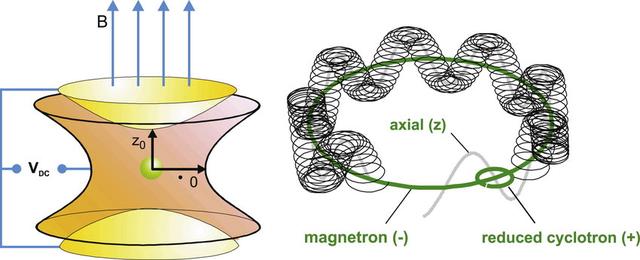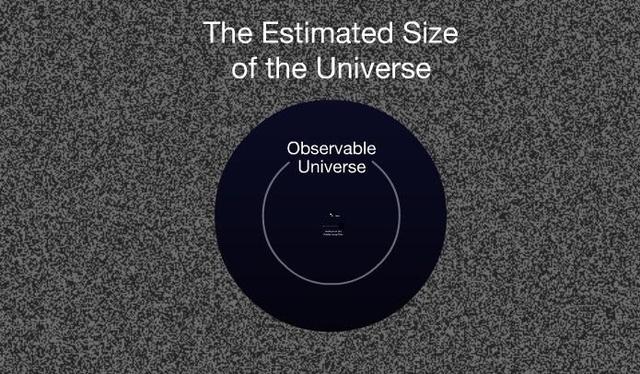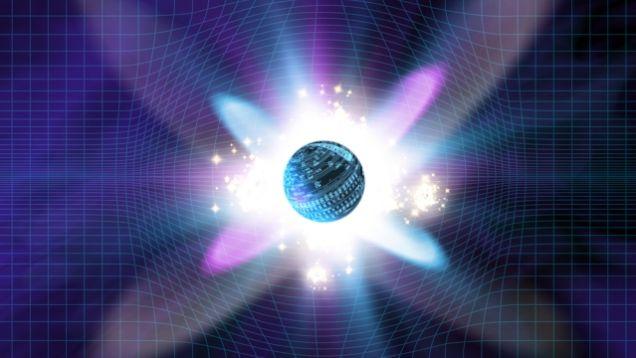In the macroscopic world, the earth moves around the sun, while in the microscopic world, electrons move around the nucleus of an atom. Although the two move in very different ways, we often associate the earth with electrons, so the question arises: If the earth were to shrink to the size of an electron, how big would the universe be after shrinking in the same proportion? To answer this question, we first need to know the size of the electron.

The above diagram shows a common model of the structure of an atom. The electron appears to be not much smaller than the nucleus, but this scale is actually wrong.
How small is an electron?
The size of an elementary particle such as an electron cannot be measured by conventional methods, so scientists initially used the method of "Throwing" A large number of electrons at a target electron and then measuring the scattering of the "Thrown" Electrons by observing the size of the space occupied by the target electrons was then measured by observing the scattering of the "Thrown" Electrons.

In this way, scientists have concluded that the diameter of the electron is no larger than 10^-16 metres.
The nobel prize winner in physics in 1989, hans-georg demelt, gave a more precise answer, in short, he created an "Ion potential well" With a diameter of only 10^-22 metres. He created an "Ion potential well" With a diameter of only 10^-22 metres and then saw if it could hold an electron.

This experiment shows that the diameter of an electron is no larger than 10^-22 m. Is there a more accurate measurement? Sorry, at least not yet, so let's take the diameter of the electron to its maximum value, which is 10^-22 metres. Ok, let's look at the size of the universe again.
How big is the universe?
There is no precise answer to this question. This is because we live in a universe that is in a state of accelerated expansion, as shown by the fact that the further two points in the universe are from each other, the more the space between them expands, that is, when the distance between two points in the universe exceeds a critical value, the speed at which they move away from each other due to the expansion of space exceeds the speed of light.

We know that the speed of light is finite, which means that light from objects that are moving away from us at superluminal speeds because of the expansion of the universe will never reach earth. In other words it means that we can only see a limited range in the universe, which is called the observable universe, a region of spheres about 93 billion light years in diameter, centred on the earth, and beyond which we can say that we know nothing.
A rigorous discussion of the unknown cannot be developed, so it is necessary to narrow down the universe under discussion somewhat to just the one we can see. So our question can be defined precisely as follows: If the earth shrinks to the size of an electron, how big would the observable universe be after shrinking in the same proportion?
At this point all the data becomes known, and with a simple calculation we can give the answer to this question.

The average diameter of the earth is 12,742 km, and after shrinking to the size of an electron, its diameter becomes 10^-22 m, a shrinkage of 1.2742 x 10^29 times. The observable universe, with a diameter of 93 billion light years, would shrink to about 6.9 x 10^-4 metres, or 6.9 millimetres, at the same scale. In other words, when the observable universe shrinks to this extent, its size is smaller than the glazed marbles we normally see.
Seeing this, i believe that imaginative people will associate it with a very interesting topic: In the microscopic world, electrons may really look like planets, and on some of them, there may be intelligent beings like us humans.

For them, the electron is like the "Earth", the nucleus is like the "Sun", the whole atom is like the "Solar system", and the densely packed atoms combine to form their microcosm, of which they can only see a part ......
Can such a microcosm really exist? Again, there is no precise answer to this question, but it is certain that even if such a microcosm existed, it could not be the same as the one we live in.
In our universe, the motion of the various bodies is dominated by gravity, but in the case of electrons, the role of gravity is negligible, basically negligible, and the real dominant force is electromagnetism, which we all know is much stronger than gravity, and there is also a repulsive force in electromagnetism.


